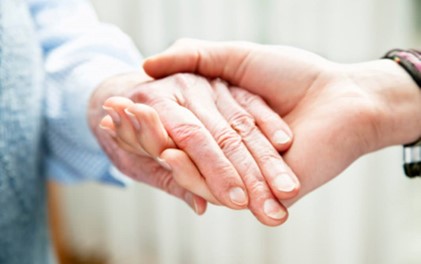Breaking Bad News
Breaking the news that someone has died can be particularly challenging for professionals, especially where a death was sudden or unexpected.
There are many resources available to help if this is your responsibility, if you support other colleagues with this task or you support those who are receiving the news.
This video, produced by the Irish Hospice Foundation outlines a simple five step process to breaking bad news.
Download this sheet which accompanies the video for more information.
Ripples of grief – tips for looking after those who are bereaved and your own wellbeing
This film explores ways in which healthcare professionals can support people who are bereaved as well as look after their own wellbeing. It is structured around ten tips and features perspectives from three of NHSScotland’s Health Board Bereavement Strategic Leads & Coordinators.
Click on the image to the right to watch the video or here to view it on the NHS Education for Scotland Vimeo channel
A transcript for this film will be coming soon.
Why good communication matters
There is a range of evidence (Stephen et al 2006) that the way those who have been bereaved experience the events around the time of death will influence the trajectory of their grief journey. Where health services get it right, showing empathy and providing good quality care, bereaved people are supported to accept the death, and to move into the grieving process as a natural progression. Conversely if the health services get it wrong, then bereaved people may experience additional distress, and that distress will interfere with their successful transition through the grieving process, with implications for them, those around them and for the social economy of the nation.

(Stephen et al, 2006 cited in Shaping Bereavement Care, A Framework for Action for Bereavement Care in NHSScotland, Scottish Government Health Directorate, February 2011 available here)
Talking to those who are bereaved
People who are grieving often recall the words and phrases which are said to them around the end of life, and in bereavement, for a long while after a death.
At some stage, the majority of professionals who work within health and social care will interact with those who are bereaved during the course of their work. Even if it is not a core part of your responsibility to support or work with those who have been bereaved, it is beneficial to have a certain level awareness about bereavement and communicating with those who are grieving.
This NHS Education for Scotland video, right, aims to help health and social care professionals communicate with families in this situation.
A transcript of this video can be found here and a downloadable leaflet which accompanies the video can be found here.

Anticipatory grief
It is often assumed that grief and grieving will only begin after a death. This is not correct.
People may begin to experience anticipatory bereavement in the lead up to the death of a friend or relative.
Where possible, and if appropriate, professionals should acknowledge this, and enable people to access the support which they may need.
The value of listening: a life shared
This film showcases Brigid Russell talking about her husband, Jim’s death and how it feels for her to live with grief and bereavement.
Click the image to the right to watch the video or here to view it on the NHS Education for Scotland Vimeo channel.
A transcript of this video can be found here.
What about me as a professional?
Professionals are not immune from the experience of grief and bereavement. You may be affected by an end of life experience within or outwith your work.
A lack of time and space to come to terms with the deaths which you experience at work can have a negative impact.
It can be helpful to take time to deal with the end of life situations which you may witness, through debrief with colleagues and reflection.
NHS Bereavement Co-ordinators and Spiritual Care Leads in Scottish Health Boards can provide an important resource for healthcare staff regarding methods of accessing support and guidance. For more information go to our page on Resilience and Wellbeing
Do's and Don'ts of communication who those who are bereaved
Do's
-
Acknowledge their grief
-
Take time to listen - attentively
-
Suggest a quiet place to sit together
-
Use the name of the person who has died
-
Share resources - leaflets and contacts
-
Remember everyone is different
Don'ts
-
Say you know how they feel - you can't
-
Talk about your own experiences
-
Use platitudes like 'time is a great healer'
-
Rush the conversation
-
Promise what you cannot deliver
-
Forget that you need support too
(Do's/ Don'ts produced by NHS Education for Scotland, content developed by Cruse Bereavement Care Scotland, © CBCS 2014)
For more information
There are many written resources available for those who are bereaved, but which you may also find helpful to read as a professional. Some of these provide general bereavement information, e.g. the Scottish Government When Someone Dies booklet or NHS Health Scotland: Talking about bereavement
Other materials relate to specific circumstances e.g. Loss & bereavement in people with dementia, Alzheimers Scotland
Other documents of relevance are:
Grief Support Guide, National Bereavement Alliance
End of life care: The wishes and needs of the bereaved, General Medical Council
Shaping Bereavement Care, a framework for action, 2011
Also for more information, go to the Support Around Death page on death related discussions and the Education, learning and resources page